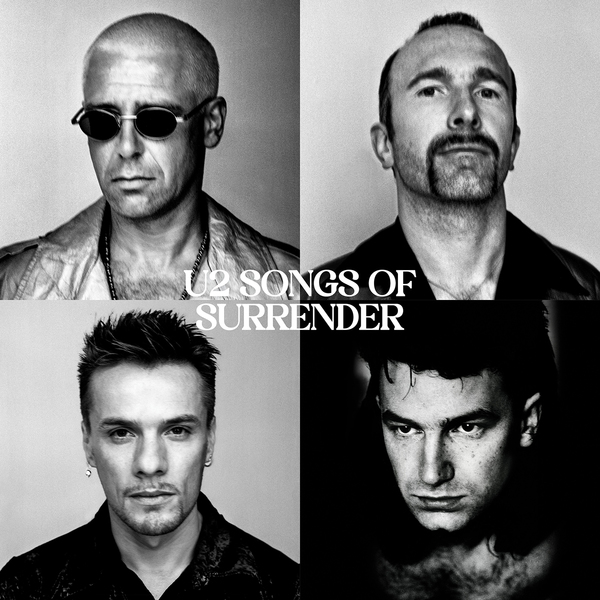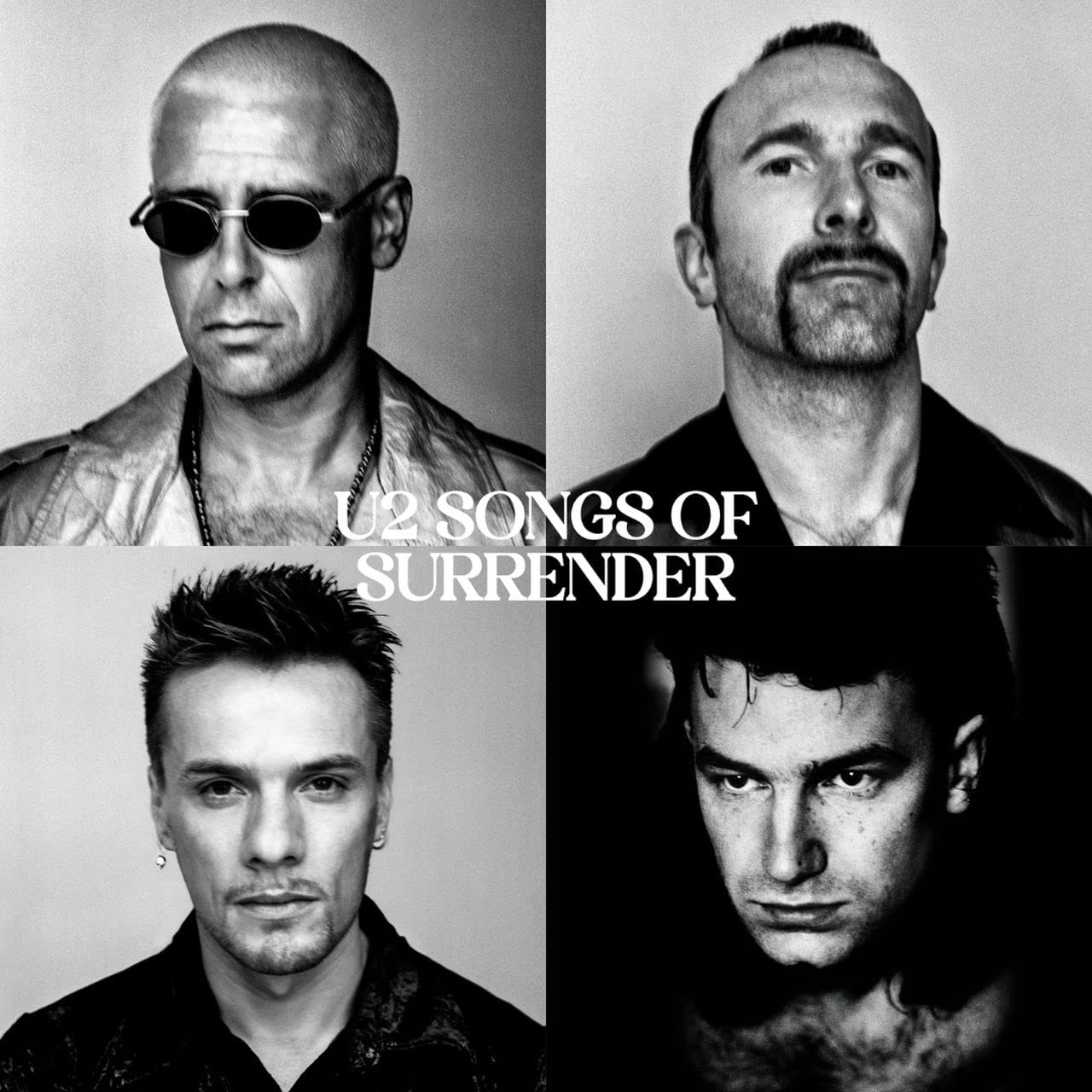 U2
U2
Songs Of Surrender
Interscope Records [2023]

A while back, it became cool for a significant moment in time for major touring rock acts to pause in the middle of their set and pull out the acoustic guitars and move to a couch on the edge of the stage to create an intimate concert moment, no doubt a nod to the popularity of “MTV Unplugged” performances in the 90’s, from acts like Eric Clapton and Nirvana. There are numerous tracks on this 40-song collection, Songs of Surrender, drawn from every era in the massive U2 catalog (with the exception of two albums, October and No Line on the Horizon), that have that “let’s sing around the campfire” vibe.
“Sunday Bloody Sunday,” stripped of its martial drum marching orders, and the angry anthemic chorus-chant domesticated by the 4 decades that have passed since that song opened the War album and inspired the flag-waving introduction of the band to a wider audience on the televised video, U2 Live at Red Rocks: Under a Blood Red Sky, is one such track. Leaning largely on The Edge’s acoustic guitar and Bono’s soulful vocal, rendered now in the past tense with more of a solemn reverence than the original’s rage at the violent images of bodies lying in the street, this rendering bears the emotional weight of the lyrics, the melody now a comforting well-worn friend, reconsidered after years of hard-won peace in Ireland.
In the over 40 years since “I Will Follow” announced that Ireland’s newest punk band had a pretty compelling way with a melody, U2 has become one of the most popular rock acts in the world, celebrating the massive success of their fifth album, 1987’s The Joshua Tree with major tours in 2017 and ’19. To the band’s credit, though, they weren’t merely resting on the laurels of past victories but were creating new music in 2014’s Songs of Innocence and ‘17’s Songs of Experience, albeit these under-rated collections tended to look back on the band’s youthful early days for inspiration. While these latter-day albums failed to deliver the kind of airplay and commercial success of their past, they did deliver one of the most artful and technologically advanced live, arena shows during their 2015 and ’18 tours.
Having reached a level of success and an age when it’s more or less natural to reflect back on past accomplishments, those remembering The Joshua Tree tours, plus the anticipated revisiting of Achtung, Baby and those notorious ZooTV spectacles on their 40th year anniversary, together with Bono publishing his memoir, Surrender; 40 Songs, One Story, and no doubt facilitated by the pandemic shut-down, The Edge began this project that reimagines, reinvents, and re-records 40 of the band’s songs. Some getting the acoustic treatment described for “Sunday Bloody Sunday,” others deconstructed down to piano like “Every Breaking Wave,” which has some light orchestration, and still others a more ambient delivery.
Of course, the underlying thinking is the standard idea that the measure of a really “good song” is that it’s just as powerful stripped down to basics, the essential chords, the melody served by an unadorned vocal, once all the electronics and studio enhancements, loud guitars and noisy rhythm section and/or orchestration or other distracting trappings have been removed. It’s a commonly held belief, but it overlooks the role an overdriven electric guitar sound or the vibrancy of a funky rhythm contributes to the whole of a composition, as well as the excitement and emotional currency created by the chemical reaction when musicians combine the individual elements to create something greater than the sum of its parts. Sometimes you only need to hear the opening guitar or keyboard line or a drum part to recognize a favorite song, there are numerous sonic elements that contribute to a listener’s appreciation of a song.
There’s a moment in the Disney+ U2 in Dublin doc, A Sort of Homecoming when The Edge plays the opening to “Where the Streets Have No Name,” on an electric guitar with the benefit of all his chorus and delay effects for David Letterman. The former host of “Late Night” asks him to play it again, one more time because “it’s just so good.” That is a great, magical musical moment that every single U2 fan would recognize, and without even hearing the melody or Bono’s vocal and lyrics, the warm resonance and beauty of the song washes over you even in those first few bars. So, no, the airy, ambient synth intro on this newer version could never come close to packing the emotional punch of the original version.
On the other hand, there are a couple of songs performed by Bono and The Edge on that Disney+ production that work nicely with the acoustic guitar thanks to the bold orchestration of the cello and violin parts, that gives a song like “Vertigo” a second life, that carries over to the newly recorded version. And, you can say the same of “Beautiful Day,” this time with The Edge on piano, where you can also notice Bono’s additions to the lyrics, it lacks the arena-filling dynamics of the original, but the new version stands up well enough. But that’s the challenge here. Of course, some songs do well with those more intimate, acoustic performances, either at a concert, or reshaped for a TV special, lots of artists have done this during special tours. Elvis Costello is one artist who has stepped away from his band on occasion to play acoustic solo sets, or with the support of pianist Steve Nieve, and Lord knows Bob Dylan has played fast and loose with the arrangements, words and even melodies of some of his biggest hits during live shows.
But U2 has taken this kind of musical experimentation and reinvention to an altogether new level, by applying this approach to many of their beloved hits, and tracks from every twist and turn in their ongoing musical evolution. Plus, making Songs of Surrender a major recorded undertaking, and a serious commitment – 40 songs that takes 2 hours and 45 minutes to take in even once – releasing it as their first “new” album in nearly 6 years is certainly asking a lot of their fans. It’s not like they just threw these new ideas up on their website for fans to visit and listen to whenever they were inclined, U2 has shaped this as an altogether new artistic moment, and promoted it big time as a commercial venture, where at best it’s a mixed bag.
There are moments that feel like a revelation; like the acoustic, soulful reading “Ordinary Love,” or the smart revision of “Bad.” And of course, quite a few of these songs work as acoustic sing-alongs that would work great in the pub, like “Who’s Gonna Ride Your Wild Horses,” “With or Without You,” or “Invisible,” with its glorious lyric that “there is no them, there’s only us.” And of course, it’s great to be reminded of great old songs like “11 O’Clock Tick Tock” and “Out of Control,” two where we get to hear The Edge delivering some fun, acoustic soloing. And it’s great to pluck a nugget like “Red Hill Mining Town” out of obscurity and bring it to life with a brass band, and reintroduce less well-known songs from those newer projects, like “Lights of Home” and “Cedarwood Road.” But does anyone really want or need a watered down, vacuous version of “One,” one of the band’s most memorable and covered singles? No… just no. And the reasonably forgettable “Miracle Drug”? Again, no. There’re another half dozen very forgettable tracks here, but I can’t remember which ones they were.
There’s no objective way to look at this project, because from the beginning, over 40 years ago, U2’s music and presence has always demanded a visceral response, and for those who connected with the artistic expression of these four irrepressible, ever-growing and evolving Irish men we forged an emotional bond not only with their music and their over-the-top methods but with them as artists and people. Even after having a lukewarm experience listening to some of the vast array of songs presented on Songs of Surrender, I watched the YouTube video interview with them in the Airstream RV in the American desert near Joshua Tree, and then the Letterman in Dublin documentary and my eyes teared up numerous times listening to their music, and listening them describe the alchemy of turning painful life experiences into beautiful, transcendent music.
At some point in all those interviews, The Edge mentioned that in addition to producing this album, he and the band have also been working on some new guitar songs for a future project. With the 40-year salute to Achtung, Baby on the horizon, it’s enough to make a long-time fan long for yet another burst of inventive, experimental rock. Hope, as they say, springs eternal.
One strength I appreciate in these newest revisions are the places where Bono has added to the lyrics of songs like “Beautiful Day,” where he alludes to the biblical story of Adam and Eve by having the guy apologize to the woman for all the damage done, or the changes to “Sunday Bloody Sunday” that turn it into a Gospel prayer in the end. I’ll still prefer the sonic impact of the flag waving martial drum version, but the spiritual prayer for peace resonates at a deep level, along with the adaptation to “Walk On” as an anthem for Ukraine in the midst of the most recent needless war. In their lament for that violent day in Irish history, U2 asked, “how long, must we sing this song?” It’s a phrase from the Bible’s lament Psalms, that gets repeated in their song “40,” an interpretation of Psalm 40. To the longing of humanity for redemption, for wholeness and peace, the only answer has to be: for as long as it takes.
While Songs of Surrender at times meets a nostalgic moment, it proves to only serve as a place holder, it fails to take the U2 story further. But, for many fans it will keep the fire burning, while we wait for the next artistic chapter.
KEY TRACKS
“Walk On (Ukraine)” / “Bad” / “Vertigo”
ARTISTS WITH SIMILAR FIRE
Coldplay / The Choir / The Church
U2 REVIEW HISTORY
Songs Of Experience (2017) / Songs Of Innocence (2014)
U2 LINKS
Official Website | Facebook | Instagram | Twitter | Interscope Records
- Ryan Adams: Heatwave | Star Sign | 1985 | Sword & Stone [Album Review] - February 13, 2024
- Sarah Jarosz: Polaroid Lovers [Album Review] - January 31, 2024
- Green Day: Saviors [Album Review] - January 26, 2024

